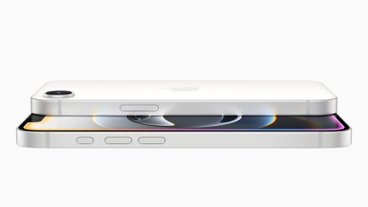As Paul Otellini relinquishes the reins of chipmaker Intel, the outgoing chief executive reveals in an in-depth profile that he ultimately passed on a contract to build the silicon which powered Apple's original iPhone, a regretful decision given the handset's wild success.
In an interview with The Atlantic, Otellini said Intel had the chance to be an integral part of Apple's iPhone project by manufacturing the processors that power the device, but the executive decided against moving forward with what would have been a winning bid. Otellini is retiring from his post today.
"We ended up not winning it or passing on it, depending on how you want to view it. And the world would have been a lot different if we'd done it," he said.
Apple ended up using a Samsung-built ARM system-on-chip design for the first iPhone, and has subsequently relied on the architecture for its entire iOS device lineup. The Cupertino, Calif., company introduced its first in-house designed ARMv7 core with the A6 SoC used in the latest iPhone 5.
"The thing you have to remember is that this was before the iPhone was introduced and no one knew what the iPhone would do," the Intel chief said. "At the end of the day, there was a chip that they were interested in that they wanted to pay a certain price for and not a nickel more and that price was below our forecasted cost. I couldn't see it. It wasn't one of these things you can make up on volume. And in hindsight, the forecasted cost was wrong and the volume was 100x what anyone thought."
With Intel out of the game, Apple turned to supplier Samsung for its chipmaking needs. The Korean company's fabrication facilities are still used to churn out Apple's A-series processors, though the partnership may soon end as tensions between the two companies reach a breaking point.
Still, Samsung has greatly benefitted from the lucrative Apple contract for the past six years, an enviable position that could have been Intel's.
"The lesson I took away from that was, while we like to speak with data around here, so many times in my career I've ended up making decisions with my gut, and I should have followed my gut," Otellini said. "My gut told me to say yes."
 AppleInsider Staff
AppleInsider Staff







-m.jpg)






 Wesley Hilliard
Wesley Hilliard
 Christine McKee
Christine McKee
 Malcolm Owen
Malcolm Owen
 William Gallagher
William Gallagher
 Andrew Orr
Andrew Orr






-m.jpg)




39 Comments
At the end of the day I don't think Apple would have picked Intel because their chips used too much power when compared to ARM.
Could have... would have... should have... but you didn't. Hindsight always provides a view with 20/20 vision. If your gut said to do it, and you didn't, well then cry me a river. You failed as a decision-maker. That's what you get for looking at spreadsheets and numbers by pencil-pushers instead of seeing the bigger picture. Now, Intel - under your watch - is slowly becoming irrelevant in a post-PC world, and you and your wasteful, inefficient PC-cronies contributed to it. Have a nice day.
At the end of the day I don't think Apple would have picked Intel because their chips used too much power when compared to ARM.
Nothing was said in the article that says this would've been an x86 chip -- it could've very well have still been an ARM chip, with Intel as the manufacturer. We just don't know.
At the end of the day I don't think Apple would have picked Intel because their chips used too much power when compared to ARM.
Really depends on when these talks took place. Intel sold its XScale (ARM processor) line to Marvell in June 2006. Maybe their decision was the result of balancing the $600m bid from Marvell against a potentially lossy business with Apple...
At the end of the day I don't think Apple would have picked Intel because their chips used too much power when compared to ARM.
From the sounds of the article, Apple already had an ARM chip design in mind and were simply looking for a fab... Intel definitely didn't have an x86 chip that could compete with ARM on battery life at that time.